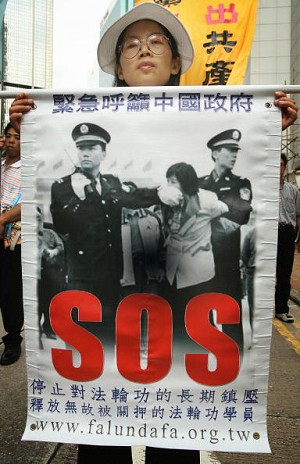|
|
| A Falun Gong practitioner holds up a banner protesting the persecution of the spiritual group in mainland China. Last week, vice-president of the European Parliament returned from a three day investigation into human rights abuses in mainland China. |
A vice-president of the European Parliament returned last week from a three day investigation into human rights abuses in mainland China.
He is the first high-level western official to personally meet with persecuted Falun Gong practitioners inside China. The facilitator of the gathering, a Boston businessman and Falun Gong practitioner himself, was arrested and deported for "hosting an illegal meeting."
Over the course of several days, Vice-President Edward McMillan-Scott met various Chinese diplomats, experts, and intellectuals. In the mid-1990s, as a member of the EU Committee on Foreign Affairs, McMillan-Scott investigated the Chinese Communist Party's political practices.
"Ten years later it saddens me to report that China remains a brutal, arbitrary, paranoid system in which free speech does not exist, in which freedom of thought is constrained, in which freedom of religion is severely curtailed, and where the process of reform, in political and social terms is, quite frankly, glacial," said McMillan-Scott at a Hong Kong press conference on Wednesday.
On May 21, McMillan-Scott held a secret meeting in a hotel with two Falun Gong practitioners from Beijing. They provided evidence of the persecution, including maps of detention centers and labor camps they had been sent to, receipts from the police showing how much money they were forced to pay for their release, and various documents their employers and relatives were forced to sign.
One Falun Gong practitioner said that while in a labor camp he had been forced to manufacture jade jewelry for export to Europe.
Both of them said they knew about the Chinese regime's practice of organ harvesting from live prisoners of conscience. One of them claimed to personally know a Falun Gong practitioner who had been killed this way.
"The experiences they relayed to me... leave me very, very saddened not just for them, but for anybody else in China who tries to adhere to a religion which is repressed by the regime," said McMillan-Scott.
Steve Gigliotti, who facilitated the meeting said, "In the middle of the meeting, the VP asked them, 'Are you risking your lives by being here today to talk to me?' And both practitioners without hesitation said yes."
Following the meeting, neither has been heard from.
One of them was even willing to have his face photographed to help expose how real the persecution is. Gigliotti said McMillan-Scott told him that the fact that the practitioner wanted to show his face showed him that he had nothing left to lose.
Shortly after leaving the meeting, Gigliotti was followed by plainclothes police, who pulled him into an unmarked car, pulled a hood over his head, and took him to a detention center and later a hotel room. He was interrogated for 26 hours, threatened, and deprived of sleep before being deported back to the U.S.
They searched him and his luggage, copied the hard drive from his laptop computer, and transcribed his cell phone address book. Gigliotti said he believes he was treated especially harshly by the police because he practices Falun Gong.
Gigliotti is not the first Western Falun Gong practitioner to be arrested in China. In November 2001, 35 Caucasian practitioners from around the world went to Tiananmen Square and held up a yellow banner that read "Truth-Compassion-Tolerance," Falun Gong's core principles. Within one minute they were surrounded by police vans. After being thrown inside the vans they were taken to a detention center and had their belongings confiscated. Many were beaten and several were injured. They were deported the next day.
In early 2002, a second group of approximately 120 practitioners from around the world gathered in Beijing to make a peaceful appeal. Nearly 100 of them were rounded up throughout the city, detained, and deported. One woman was held for a week in a Chinese jail.
China is the last large nation to be ruled by a one-party dictatorship. India, with 1.1 billion people, almost as many as China's 1.3 billion, has had a democracy since the time of Gandhi over half a century ago.
McMillan-Scott sees the current wave of resignations from the Communist Party as an important factor for the future development of China.
"[It's hard] really to know whether it is true that ten million people have torn up their Communist Party cards, but if they have, it's just not enough," he said at the press conference last week. "I would hope that a hundred percent of the current membership of the Communist Party of China would tear up their cards if they knew the truth."
McMillan hopes that human rights organizations around the world can unite to focus on China in advance of the 2008 Beijing Olympics.
He said, "It is after all the biggest and most repressive regime left on earth."
http://theepochtimes.com/news/6-5-28/42032.html
Category: Falun Dafa in the Media






